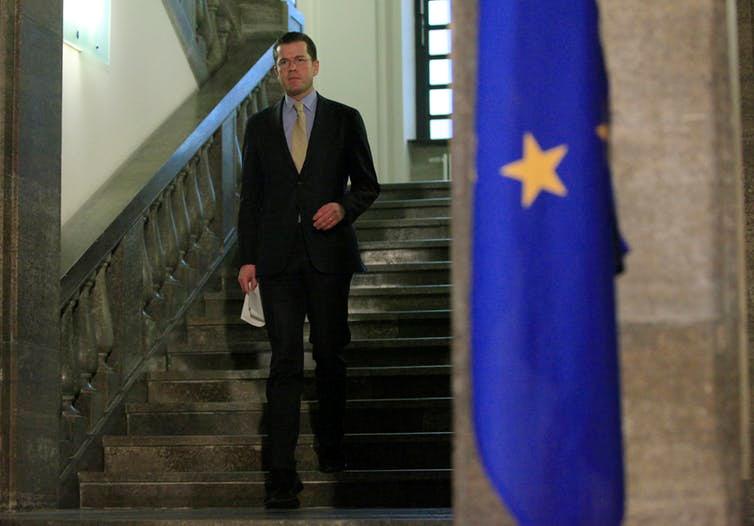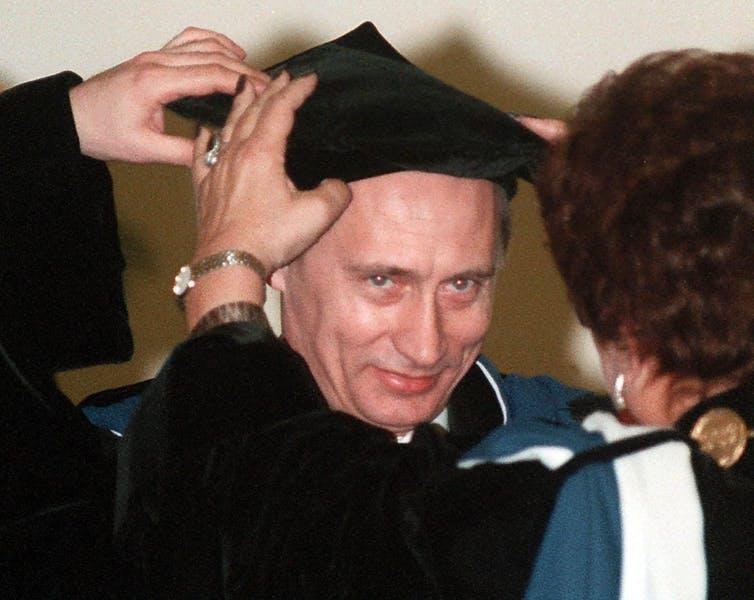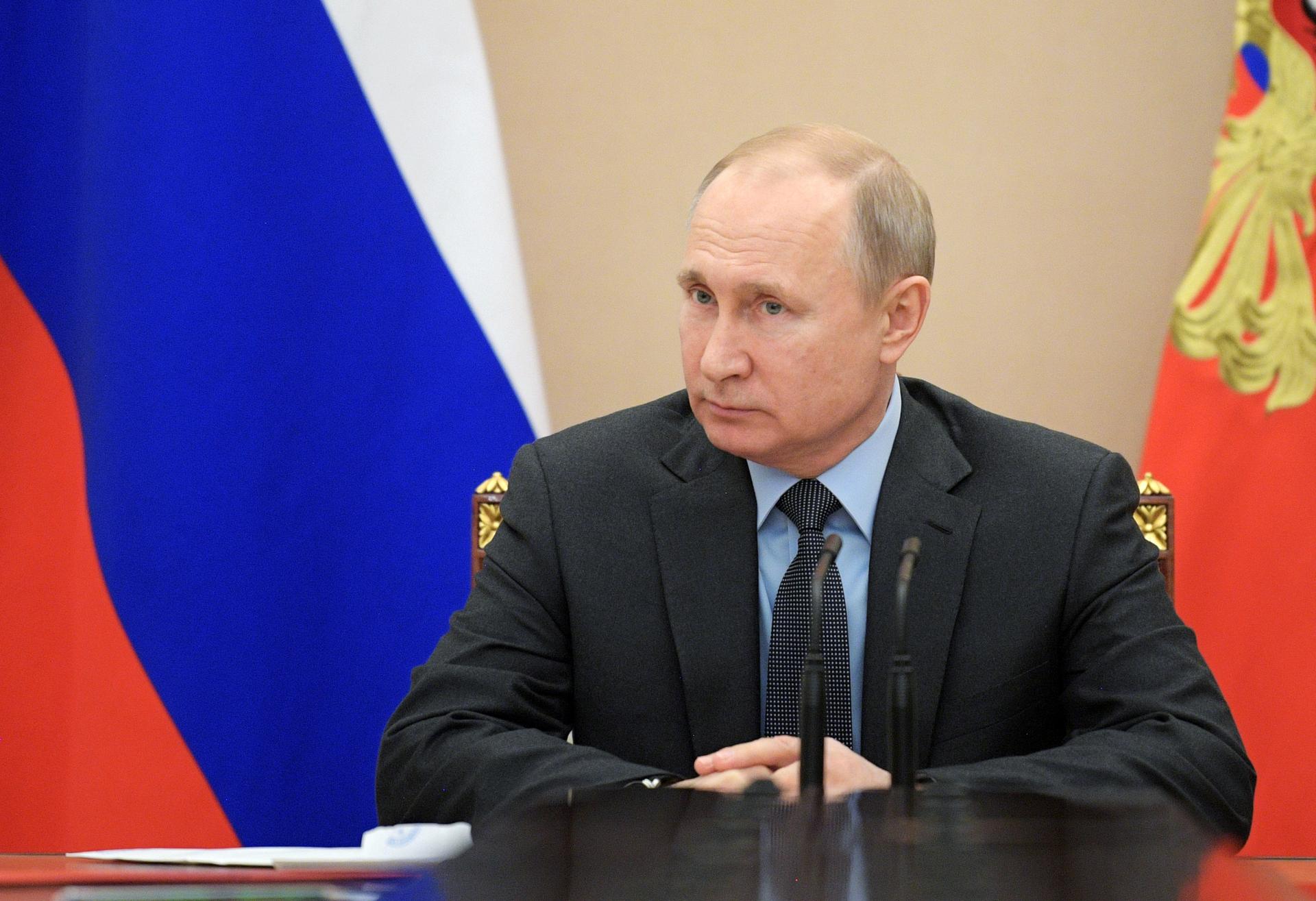Putin’s plagiarism, fake Ukrainian degrees and other tales of world leaders accused of academic fraud
President Vladimir Putin is one of the many world leaders accused of holding fraudulent academic credentials.
A recent college admissions scandal in the United States, which revealed that wealthy parents had bribed officials at elite universities, exposed the price some people are willing to pay to say: “I went to an Ivy League school.”
In a country where the myth of academic meritocracy persists despite plenty of evidence to the contrary, many people were shocked to learn that the education system was rife with illegal and unethical conduct.
But academic fraud is nothing new — and it wasn’t invented in the United States. In certain countries, my research on academic corruption attests, some public officials have built their entire political careers on the false pretense of scholastic achievement.
Related: As decision nears in Harvard affirmative action case, another legal fight brews in California
Lying leaders
You’d think that former German Minister of Defense Baron Karl-Theodor Maria Nikolaus Johann Jacob Philipp Franz Joseph Sylvester Buhl-Freiherr von und zu Guttenberg already had a long enough name.
But in 2006, he decided to add the title of “Dr.” to it, completing his doctorate of law at Germany’s University of Beyrouth.
Or so he said.
It turns out that Guttenburg, then widely seen as the successor to Chancellor Angela Merkel, had plagiarized large sections of his PhD dissertation comparing US and European legal systems.
The internet sleuths who outed his fraud in 2011 gave Guttenberg yet another name — the sobriquet “Googleberg.” He was forced to resign and, in the United States, landed an honorary position at the Washington-based Center for Strategic and International Studies think tank.

Romanian Prime Minister Victor Ponta initially tried a different approach when he was accused of academic plagiarism soon after taking office in 2012: He denied everything.
“The only reproach I have is that I did not list authors at the bottom of each page, but put them in the bibliography at the end,” he said.
Ponta quit his post in 2015 after going on trial for tax evasion and facing a series of other scandals.
But he still defended his academic honor.
“After … stepping down from the political scene, I wish to pursue a new doctorate while adhering to and respecting all of the standards and requirements,” he said bravely, after admitting to having plagiarized more than half of his 2004 dissertation on the International Criminal Court.
Ponta later wrote to the rector of Bucharest University to renounce his degree.
Denial: The strongman’s tactic
Russian President Vladimir Putin has been far less receptive to repeated allegations that he was not the intellectual braintrust behind his 1997 dissertation, “Mineral and Raw Materials Resources and the Development Strategy for the Russian Economy.”
Accusations against Putin first surfaced in 2006, when an investigation by the Brookings Institution alleged he copied about 16 pages of his 200-page PhD dissertation from other sources.
Twelve years later, the Russian strongman found himself defending against accusations that his dissertation had been ghostwritten. According to former Russian legislator Olga Litvinenko, Putin’s dissertation was written by her father, Vladimir Litvinenko, Putin’s academic adviser and the rector of Saint Petersburg Mining University.
Also helpful in “writing” Putin’s dissertation, says Litvinenko: a photocopy machine.
Employing the only cut-and-paste technology available in the late 1990s, she says her father helped Putin cheat by using scissors to snip paragraphs from various sources, glued them together and copied them to create new pages in his dissertation.
Putin has never responded to the allegations.

Models of cheating
Guttenberg’s, Ponta’s and Putin’s reactions to their false doctorate scandals are all completely appropriate, my research finds — if you consider the cultural context in which each occurred.
Leaving office after allegations of academic corruption, as Guttenberg did, is a rational response in his situation.
Germany ranks sixth of 129 countries worldwide in terms of adherence to the law, according to the World Justice Project’s annual “rule of law” index. There, such criminal acts bring professional disgrace.
In an emerging democracy that still struggles with corruption, however, such as Romania, bravado is a reasonable way to handle allegations of academic malfeasance. Among European countries, Romania is among the least likely to hold public officials accountable for abuses of power or to demand transparency from government employees, according to the World Justice Project, which ranks the rule of law worldwide.
And in a well-established autocracy like Russia, frankly, top politicians can afford the luxury of simply ignoring allegations of a falsified resumes. Putin has held top office, as either president or prime minister, since 1999.
His grip on power is so all-encompassing that he is immune to the negative consequences of academic scandal — or pretty much any scandal.
Ukraine’s dissertation factories
The same holds true in Ukraine, another struggling young democracy.
In Ukraine, it is traditional for top politicians to hold doctorates. All of the five presidents that have run Ukraine since its independence from the Soviet Union in 1991 have had their PhDs — at least in theory.
But since the country has dozens of private firms that offer ghostwritten dissertations for sale, it has also become a Ukrainian tradition to expose politicians with unearned doctorates.
President Viktor Yanukovych’s doctorate and professorship was called into doubt when people noticed that his 2004 application to run for president contained numerous grammatical errors — including the misspelled word “proffesor.”
In 2017, former Ukranian Prime Minister Arseniy Yatsenyuk was also accused of plagiarizing his dissertation.
Both followed Putin’s model: Ignore the scandal and hope it will just go away.
It did. Yanukovych became president on his second try in 2010. Yatsenyuk remains one of Ukraine’s leading politicians.
Don’t ask me about my degree
When asked about how they made their fortune, billionaires often cite Henry Ford’s quip: “I am ready to account for any day in my life, but don’t ask me how I made my first million. The car manufacturer’s bon mot hints at the shady — sometimes illicit — origins or great wealth. Forsome European and Russian politicians — or even American college graduates — today, the modern equivalent might be, “Don’t ask me how I earned my degree.”![]()
This article is republished from The Conversation under a Creative Commons license. Read the original article.
Editor’s note: This article was updated to correct several statements related to the circumstances around Guttenburg’s leaving Germany.
